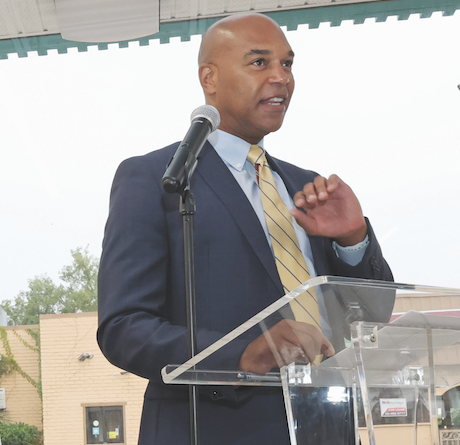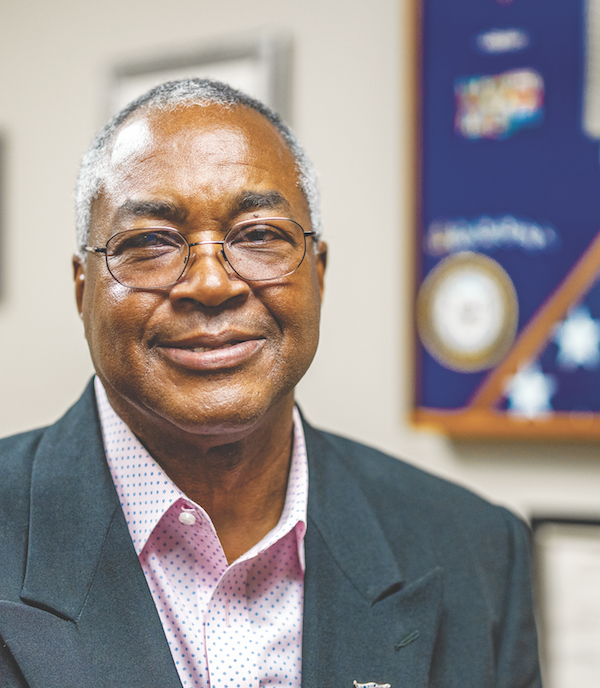Called to Serve
Jeffery Askew and Jamie Ulmer both credit their military service for instilling in them the value of service to others, regardless of skin color.

Jamie Ulmer [Photo by Bruce Ackerman/OG]
- Q) What does Black History Month mean to you?
Askew: It’s an occasion to celebrate the achievement of many African Americans who have gone boldly before me, and it’s a chance to inspire others. Not only those are who are of African American descent, but all Americans. If we can achieve something, so can they.
Ulmer: Black History Month means two things to me: diversity and sacrifice. Diversity is a hot topic now; however, it has always been a hallmark of my definition of a great organization. I do not only mean diversity of ethnicities or races. I am speaking of total diversity, including ethnicities, race, religion, and wherever you may originally be from, no matter if you were raised in a metropolitan, suburban or rural area. When you instill in an organization people from all walks of life and places, no matter what their color may be, you get an organization that will operate at a heightened level of performance, not to mention people learning from each other from their culture and different ways of doing things. I am proud to be the CEO of one of the most diverse organizations in Ocala and Marion County. I believe our tremendous amount of success has been derived from this principle. Regarding sacrifice, I get butterflies in my stomach to think that someone literally gave up their life or livelihood to help establish a better life for me. It definitely makes me keep trying to make an impact, and to make lives better for people around me.
- Q) What does your position mean to you?
Askew: It means I have the opportunity to help others in need, and I value that. Not just veterans, but we see a lot of spouses, widows, and widowers. Being in this position gives me an opportunity to help a lot of people and it is an example to the community as a whole, that if I could do it, you can do it. It’s just about setting your mind to what you want to do.
Ulmer: My position as the CEO of Heart of Florida Health Center means that I have an opportunity to impact people in multiple ways. The first is our patients in the community. We are overwhelmingly committed to taking care of our patients to the best of our ability, no matter what their circumstances may be. We see everyone, no matter his or her ability to pay, and we stand by that. But my most significant impact is with my employees. I only use the word “my” in two instances when I am referring to taking care of people. I take it personally when it comes to impacting my employees’ lives. Without them, we would not be able to take care of our patients. Throughout my military career, I learned that my soldiers were someone’s most prized possession, and they trusted me to take care of them—at all costs. I still feel that way today about my employees at Heart of Florida Health Center.
- Q) Describe your “path” to the position?
Askew: When I retired from the military, my first job was working in human resources for the [Marion] county commission. I was their human resource specialist. I handled recruitment, equal opportunity, I took care of the website as far as job announcements, and I also processed retirement paperwork. One day I was helping Jim Deck, the Veterans’ Services director at the time, with his retirement. He said, “Well, Jeffrey, I’m gonna be leaving here in a couple of months, and since you’ve got military experience and you have good interpersonal skills, I think you’d fit right in with this job.” A few months later, Mr. Smith, who was the assistant county Administrator, asked me if I would like to apply for the position. I was happy where I was at, you know, I liked being in human resources. But this job came open and I applied for it, and I got the job. And the rest is history.
Ulmer: I always knew I was going to be in the medical field in some capacity since I was very young. It was not until I was a senior in college that I knew I would be tracking as a healthcare administrator. Being a Medical Service Corps officer in the Army taught me a lot about healthcare administration. My first two years were mostly conducting healthcare administration in austere locations and conditions. It was not until I retired that I found my niche in public health and community health centers. It was then that I felt I could make my largest contribution to employees, patients, and the community.

Jeffrey Askew [Photo by Mark Anderson/Marion County Public Relations]
- Q) Any words of wisdom to the next generation?
Askew: I read a book yesterday, a children’s book, for the African American read-in. And the title of my book by Andrea Pippins was, “Who Will You Be?” There are a lot of role models out there, so, I’ll start with a question. And the question would be, who would they be when they grow up? What I leave with them is that you can be anything that you want to be. All you have to do is apply yourself, stay away from people who are doing things that you know they shouldn’t do. Get with somebody who is doing positive things, someone who has a positive impact on the community. Stay away from “naughty people”, so to speak. But you can be anything you want to be, and you can do anything you want to do. You don’t necessarily have to have a doctorate, you don’t necessarily have to have a master’s degree. You can have a high school diploma and still do something meaningful. Every job is important. So, they can be all they can be because there are a lot of opportunities out there for them. They just have to take advantage of them. I had an opportunity, and I took advantage of it. When they have an opportunity, they need to take advantage of it. During this month, they acknowledged a lot of people who have done great things. They can model them, they can model after their grandparents, some of their relatives who are doing good things. They can model people in the community. But there is always a place for positive people. There’s not a place for negative people. I would say to them, decide what you want to do, and then apply yourself to do it, and get someone who can help you do it. Someone who can influence you and be a positive example for you to achieve that objective and never give up. Many positive people have contributed to my success.
Ulmer: My words to the next generation would be to always have a “back-up to the back-up plan.” It builds resiliency and decreases anxiety to deal with life challenges. I would also say, become more diversified, and no, I am not talking about financially. I’m talking about with your friends, places you would like to travel or work. When people are exposed to other cultures, their heart reacts to situations in life with compassion and mercy.





